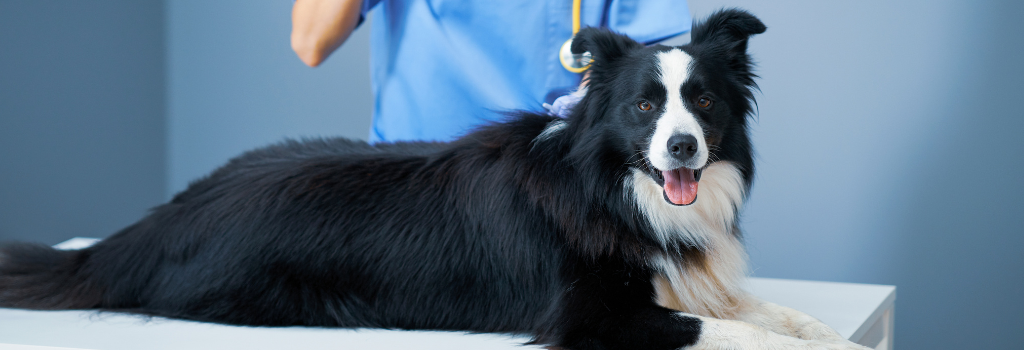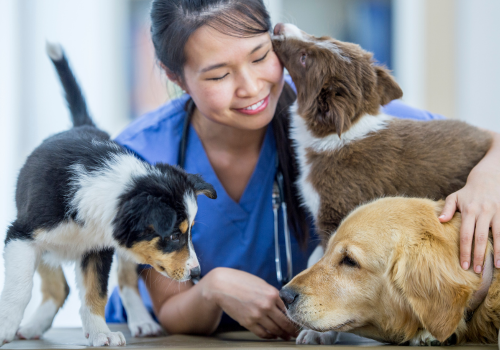Preventive care is an easy thing to shrug off as a dog parent, with the thinking that you’d rather pay a veterinarian when something is wrong. The problem with that is that pets, including dogs, are very stoic creatures. So an illness is often advanced by the time your dog shows symptoms—causing you a bigger vet bill and your dog unnecessary suffering. If you’ve heard about preventive care for your dog, you may have turned to the internet for more information, and we’re glad you found us! At Miller Place Animal Hospital, we work diligently to bring you facts that you can trust. To avoid online misinformation that’s often spread by well-meaning but ill-informed pet bloggers, we’ve taken FAQs about dog preventive care and answered them as thoroughly as possible.
If you’re looking for a highly trained veterinarian in Miller Place, NY, we’d love to get your dog on the path to optimal wellness with an excellent preventive care regimen, so please call us at (631) 744-2050.
What is considered preventive care for dogs, and why is it important?
Preventive care is essentially wellness care in dogs. It's all about proactively doing and monitoring things to keep your dog as healthy as possible for as long as possible.
Some facets of preventive care in dogs are:
- Blood work
- Heartworm tests and prevention
- Flea and tick prevention
- Intestinal parasite prevention
- Complete annual wellness exams (more often for puppies and senior dogs)
- Vaccinations for your dog's lifestyle in the area where you live
Preventive care is a way for us to try and catch things early and protect your dogs against the things that we can keep them from getting, all so we can keep giving them good health and longevity.
What information does my veterinarian need to know about my dog's lifestyle before providing preventative care recommendations?
Your veterinarian will want to know about your dog’s activity level at home, especially if they are prone to osteoarthritis. A larger breed dog, for instance, is more prone to this so if they are overweight, your veterinarian will likely recommend weight loss through diet and exercise. Also, they will want to know what their home environment is like, and whether they exercise and go on hikes and the like. Do they spend time in the water? Certain vaccines might be more important if they are. Also, that comes into play for fleas and ticks, too.

What is the difference between insurance and a wellness plan?
Pet insurance is something that you can buy and pay monthly for, just as with human insurance. That way you don't have to pay necessarily out of pocket for certain veterinary medical expenses. In the case of wellness plans, it’s more common that you pay for an inclusive package, whether it be for things like radiographs, dental exams, dental cleanings, et cetera.
Should I get pet insurance for my dog?
Most veterinarians will tell you, yes, absolutely, get pet insurance. I am a huge fan of pet insurance. I have a 14-month-old black lab. Pet insurance allows you to provide the best possible care for your canine companion. It takes money out of the equation and allows you to do what's best for your pet without having to consider how much money's in the bank. You pay a monthly fee, basically your monthly premium, and get the coverage level you need.
Most pet insurances are for ilnesses or injury, so most of your actual wellness care will be something that you will need to budget for. You know what vaccines we're going to be doing yearly along with other preventions you're going to need, so you can plan and budget for those things. Pet insurance allows you that peace of mind, that if you spend for the best possible preventative care, you're going to be able to afford the things that come up unexpectedly.
The AVMA lays out some essential and helpful information on things to consider when looking into pet insurance.
What should I be doing at home in terms of preventative care?
There are many things you can do at home to keep your dog healthy. Many of us are already doing a lot of these things. We do our research, spending time figuring out the best toys, food, and even the best beds.
Dog food has become a hot-button issue in the veterinary industry in many ways, as we are trying to quash many dog nutrition myths that can be potentially harmful. That’s why it’s best to consult with your veterinarian on dog nutrition because a quality diet is the foundation of good health. We can certainly help guide you in the face of some of the confusing information you might find.
Another thing that you can do at home is exercise. With younger, high-energy dogs, it can be a little overwhelming, and you might wonder if you’re ever going to be able to exercise them enough. Even a minimum of a 5 to 10-minute walk of your property once or twice a day can make a big difference. They're not going to be run ragged, per se, in terms of their energy level, but just that mental stimulation of the sniffs, fresh air, and novel environment can make a significant difference.
There are also other forms of enrichment, so working your dog's brain even when you can't work their body. Your veterinarian can give you a vast number of resources on puzzle toys and different games you can do. Training should always be a huge part of preventive care and enrichment, both for their mental and behavioral health.

When I'm going back and forth for regular exams, how do I keep my dog safe in the car?
That's a tough one because I think we all want our dogs to be happy with their head out the window with that classic ears and tongue flapping in the wind, but the safest thing is for your dog to be secured in the car. Thankfully, there are many great options for that. Several companies now make a high-quality safety harness where you can strap your dog in either through the latch system in the car or through a seatbelt. If that's not a good option for your dog, there are also crates that you can secure to the inside trunk, like a hatchback, of your car or the back of an SUV so that your dog is safely secured in the crate. Also, the crates aren’t going to be rolling around if the worst happens and you get in an accident. The dog must be secured in the car, their head shouldn’t be out the window, their head's not in your face, and dogs aren't in your lap causing a distraction.
When I'm exercising my dog, when can they be off-leash?
We have this idea of our dog running happily through a field while off-leash. There may be circumstances that we can do that safely, but as a general rule, you should plan to have your dog on a leash unless they're in a secured environment where you can control who they come into contact with. Many dogs out there are great off-leash and have relatively good recall, but one thing that we have to remember when we're out and about in the world is that other dogs are not always comfortable interacting with other dogs or people. They may be on a leash, but if our dogs are not and get distracted and run up to them, that could frighten that other dog as a best-case scenario. Worst-case scenario, you could end up with a dog fight. When we're out and about in the world, it’s vital to use a leash, unless, say, you're in an empty dog park, or an area that you know is secure, such as private land.
Remember that there are plenty of skunks, porcupines, and various other potential hazards that we want to avoid, even when on private land. Unless you have a bulletproof recall, use a leash nearly all of the time when exercising your dog. That doesn't have to be a tiny four or six-foot leash. There are certainly long lines, like 20 or 30-foot-long leashes that you can get to give your dog a little bit more freedom, but still, keep them safe.
What are common health issues in dogs that can be prevented with wellness care?
The first thing that comes to mind is diseases that we prevent in dogs with vaccines. Rabies is one that's required by most state laws, and that's required because it's a public health issue. Rabies is fatal when contracted by animals—there's absolutely nothing we can do, and it is contagious to people. The second most common vaccine that we give is the distemper combination vaccine. That includes distemper, adenovirus (a type of virus that causes hepatitis), and parvovirus, and I think everyone is relatively familiar with parvovirus. It can be a deadly disease, usually affects puppies, and is incredibly expensive to treat, and we’re rarely successful in doing so. There’s also a fairly critical vaccine for parainfluenza, a respiratory virus sometimes associated with kennel cough.
Another vaccine that we recommend on a pretty routine basis would be the Lyme vaccine, which is a very critical one if Lyme is endemic in your area. That likely means that you have a considerable number of deer in your area and, hence, deer ticks. These ticks are so tiny, especially in their nymph stage, that even the most fastidious tick checker could miss one. Lyme disease can be pretty devastating if we don't catch it early, so that's another thing that we do for preventative care is regular screenings for tick-related illnesses. Still, we try and take a multi-pronged approach to wellness care in general. On top of the Lyme vaccine and tick testing, we also would recommend preventions.
Getting back to other vaccines, we also routinely do leptospirosis, a bacterial organism often found in areas where wildlife congregates and any wet environment. When people think about wildlife, they think of the woods in the streams. Still, even small rodents in your area could potentially cause or carry leptospirosis, so we must protect our pets.
And we can’t forget our preventive medications, such as heartworm, flea, and tick prevention. These are easy yet necessary actions you can take to help prevent disease in your dog, and we can do those on a monthly or semi-annual basis to make a huge difference in keeping our pets safe. There are so many different things that we can do in terms of preventive care. It’s imperative that when we see your dog each year and do that complete physical to screen for problems, and that we touch base about anything you have concerns about, changes in lifestyle, etc.
If you live in or near Miller Place, NY, we’d love to see your dog to get them on a thorough preventive care plan that you can give you peace of mind, so please don’t hesitate to call us at (631) 744-2050 or email us at [email protected].



